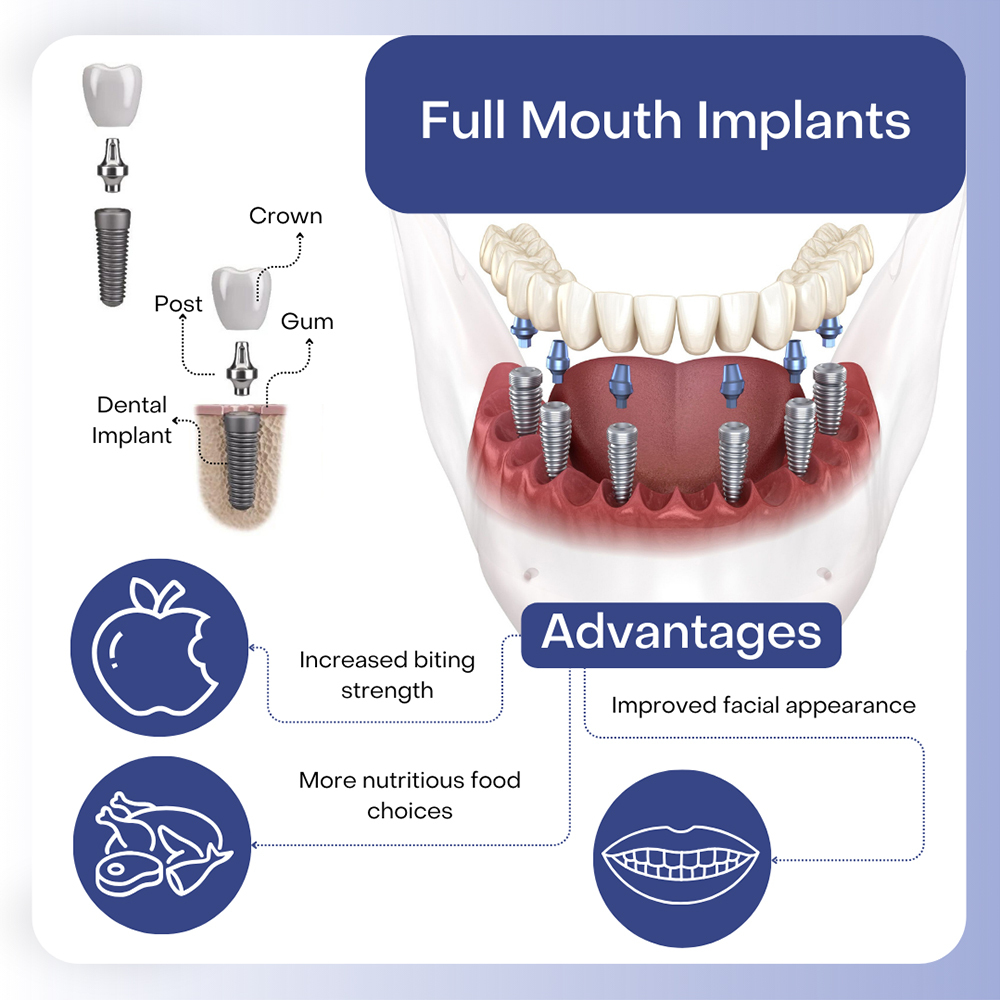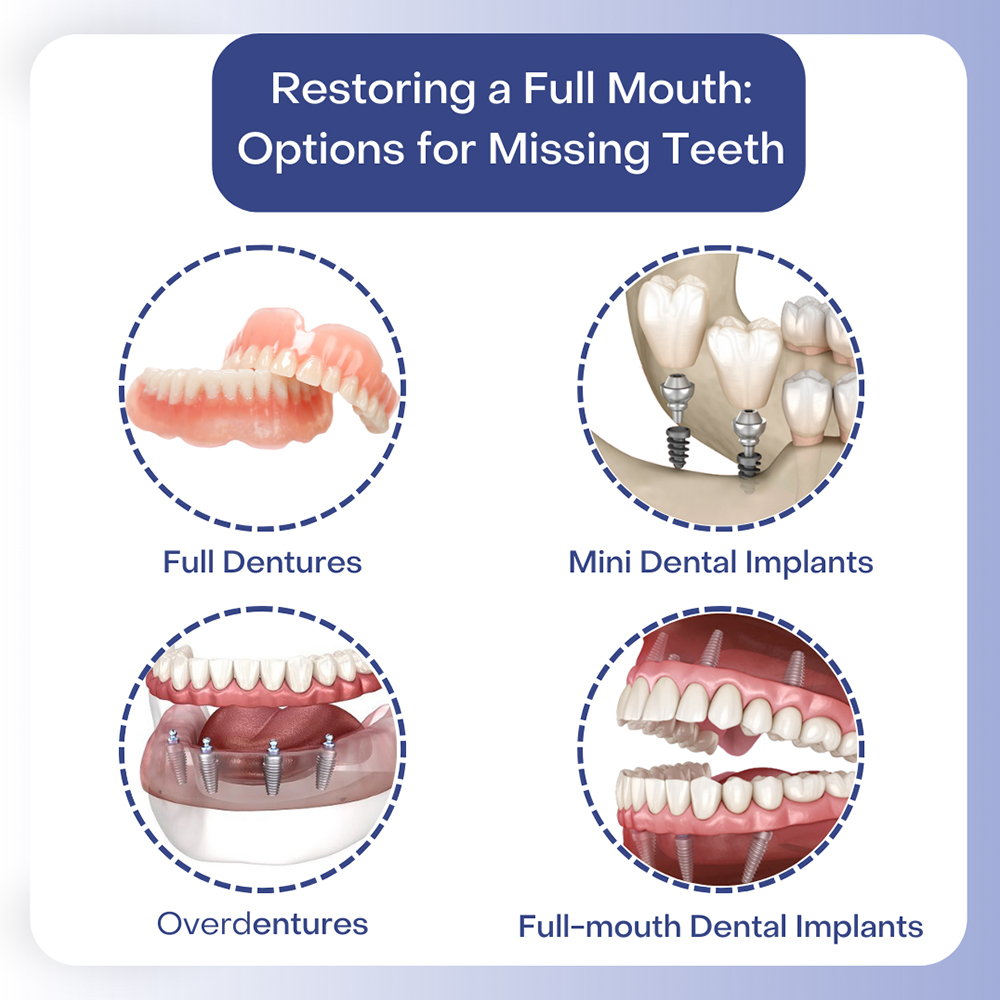Table of contents
Full mouth implants can restore a complete arch of upper or lower teeth or both arches. Teeth are restored using a dental bridge, and the implants are spaced evenly along the jawbone.
Treatment is ideal for anyone with complete tooth loss; an implant bridge can restore 10 or 12 teeth. The replacement teeth are screwed or cemented in place.
When someone visits our dental practice for full mouth implants, we can determine the best treatment option for their needs. Sometimes, relatively few implants are required to support a full arch bridge.
Other times, we may recommend more dental implants to ensure the outcome is stable, strong, and long-lasting. For example, if you wish to restore an upper arch of teeth, you may need more dental implants because the upper jawbone isn’t as strong as the lower jaw.
 A full mouth implant bridge is custom-made and can replace teeth and some gum tissue. It is designed to provide good functionality so you can bite and chew food thoroughly and comfortably.
A full mouth implant bridge is custom-made and can replace teeth and some gum tissue. It is designed to provide good functionality so you can bite and chew food thoroughly and comfortably.
Support for the facial muscles in your cheeks and lips is restored, and the implant bridge maintains the correct facial dimensions. A well-designed dental bridge can restore facial appearance and prevent facial features from collapsing inward.
Anyone who has lost a complete arch of teeth or is facing imminent tooth loss may wish to consider this treatment instead of full dentures. It can also help people who already have dentures and are looking for an alternative treatment.
Advantages of full mouth implants can include:
 A full dental examination is necessary before any implant treatment. We must review your medical history as certain conditions like autoimmune diseases or habits like smoking can impact healing.
A full dental examination is necessary before any implant treatment. We must review your medical history as certain conditions like autoimmune diseases or habits like smoking can impact healing.
Diagnostic tests include a cone beam CT scan, a 3-D scan of your jaws and any remaining teeth, digital dental x-rays, and digital dental impressions so we can complete a full assessment. It is necessary to evaluate your jawbone health. Often, tooth loss occurs because of advanced periodontal disease, which destroys the jawbone and gum tissue.
Losing some jawbone may not make you unsuitable for treatment, but you may need an additional procedure to build up the missing bone with a bone graft. Alternatively, we may suggest an implant treatment like All-on-Four, where we can sometimes work around jawbone loss by placing the implants where the bone is naturally stronger and thicker.
During your initial evaluation, we can also talk about what to expect with full-mouth implants and show you examples of restorations and possible materials that may be used. This is important as some full arch bridges might seem quite large and bulky if they need to restore a substantial amount of gum and bone. Some people might initially find these restorations hard to get used to, so we must ensure that patients have realistic treatment expectations.
If you decide to proceed, we will use your diagnostic tests to plan your treatment.
After planning your treatment, we create a computer-generated surgical stent, a template replicating your treatment plan, and place it over your gums during implant surgery. It ensures we insert your dental implants in the right position and at the correct depth and angulation, greatly reducing any room for errors and making the surgery quicker and smoother.
Some people are suitable for immediate implant restoration. When this is the case, we can fabricate the temporary bridge so it is ready to fit soon after surgery. It works by splinting the implants together so they cannot move.
Otherwise, we can ensure you have another temporary restoration to wear during healing. It might be possible to adapt an existing denture to wear while your implants fuse with the jawbone.
Implants usually take at least three months to heal and bond with your jawbone. Once healed, you return to our dental practice so we can take a dental impression to fabricate your permanent bridge.
Some minor discomfort is normal after implant surgery. Over-the-counter painkillers may control it, or we can prescribe pain medication. We might recommend using an antimicrobial mouth rinse and prescribe antibiotics to reduce the risk of infection. We will provide full instructions on keeping your mouth clean.
You must eat soft, easy-to-chew foods while your implants heal, as they must not come under any pressure. We can advise you on suitable foods so you can stock up before surgery.
Full mouth implants are not a cheap or quick solution for tooth loss, but they are permanent. Provided you oral care for them properly, you should enjoy your new set of teeth for years or life. This procedure has a high success rate; we will only recommend this option if we feel it is right for your situation.
If you want a long-term solution for complete tooth loss, please see our implant dentist at My New Jersey Dentist. We can discuss this and other options in greater detail.

My name is Victoria Kushensky. I am a general dentist dedicated to remaining at the forefront of my field. Combining compassionate care with extensive knowledge, I offer cosmetic and general dentistry services as well as advanced root canal treatments.
I earned my Doctor of Dental Surgery (DDS) degree from the esteemed New York University College of Dentistry. Throughout my career, I have honed my skills in various dental procedures, ensuring effective treatment for each patient’s unique needs. I prioritize patient comfort and understanding, taking the time to thoroughly explain procedures and address any questions.
More about Dr. KushenskyMy NJ Dentist: Victoria Kushensky, DDS
385 Prospect Ave Suite 304
Hackensack, NJ 07601
(201) 298-8000